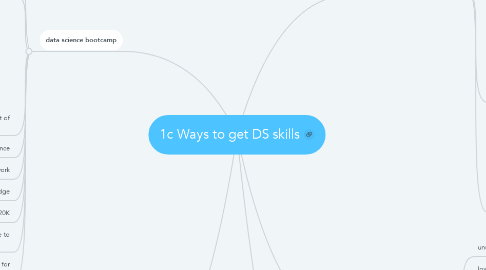
1. graduate degree in data science
1.1. Summary: good fit for people who want extensive education and can afford it
1.2. longer time period of study
1.3. gives you more time to get up to speed
1.4. exhaustive: tend to cover stats, ML, programming
1.5. very expensive
1.6. if you're from a related background, it will teach you a lot of stuff you already know
1.7. online programs will mean lower engagement
1.8. application requirements
1.8.1. letter of intent
1.8.2. transcript
1.8.3. GRE scores
1.8.4. 3 letters of recommendation
1.9. decision metrics
1.9.1. whether you'll be happy with location and lifestyle
1.9.2. what topics the coursework covers
1.9.3. how much project work the program has
1.9.4. where graduates end up
1.9.5. not important
1.9.5.1. admission requirements
1.9.5.2. prestige of the school (unless it is Stanford or MIT)
1.9.5.3. closeness of program with area businesses
1.10. do I need a Ph.D.?
1.10.1. probably not
1.10.2. usually a signal that the position is prestigious
2. data science bootcamp
2.1. 8-15 week course
2.1.1. Metis
2.1.2. Galvanize
2.1.3. 8+ hours a day
2.2. curriculum
2.2.1. DS skills
2.2.1.1. Intro stats
2.2.1.2. ML methods
2.2.1.3. Intermediate R or Python
2.2.1.4. Real-world use cases
2.2.2. Industry speaker talks
2.2.3. Projects
2.2.3.1. Collect data
2.2.3.2. Manipulate data
2.2.3.3. Run models
2.2.3.4. Create presentation or report
2.2.4. Capstone project
2.2.4.1. Room full of industry folks
2.2.4.2. Maybe your project will land you interview, job
2.3. Great for people who already have most of the skills
2.4. Instructors for guidance
2.5. Alumni network
2.6. Confidence, more than knowledge
2.7. Cost: 15-20K
2.8. Expect 6-9 months unemployment due to bootcamp
2.9. In-person bootcamps better for engagement
3. DS work in your current job
3.1. unusual but often very effective
3.2. low risk, built-in motivation
3.3. note: never become a burden for someone else
3.4. strategies
3.4.1. be proactive
3.4.2. pick off new skills one at a time
3.4.3. be clear about your intentions
3.4.4. avoid being pushy
